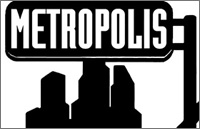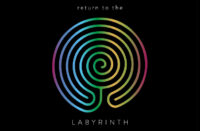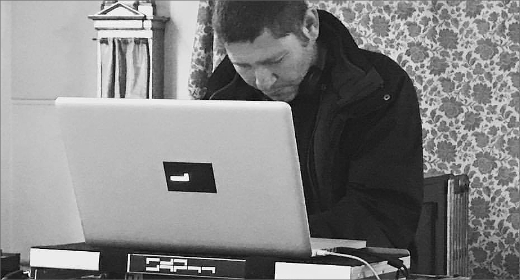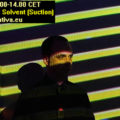 (07.08.08) I produce a show called Solipsistic Nation where I play the best of all genres of electronic music. Once a month I focus on a music label that puts out consistently great music. Previous shows have showcased such labels as Ninja Tune, Ad Noiseam and Ultimae Records. This month my guest was Dave Heckman, the founder of Metropolis Records, a record label that specializes in electro, industrial, synthpop, futurepop, darkwave, and goth.
(07.08.08) I produce a show called Solipsistic Nation where I play the best of all genres of electronic music. Once a month I focus on a music label that puts out consistently great music. Previous shows have showcased such labels as Ninja Tune, Ad Noiseam and Ultimae Records. This month my guest was Dave Heckman, the founder of Metropolis Records, a record label that specializes in electro, industrial, synthpop, futurepop, darkwave, and goth.
You can listen to my interview with Dave Heckman and Chris Corner and select tracks from artists on Metropolis Records or download the show directly by clicking here.
Igloo :: Metropolis Records is a label that commands a lot of respect from people who love industrial, synthpop, darkwave and goth. Metropolis Records began as a record store called Digital Underground. How did Metropolis Records go from its humble beginnings as a record store to the record label empire that it is today?
Dave Heckman :: When we began bringing this kind of music to Digital Underground back in 1991 there weren’t really a whole lot of record stores that were and I originally started buying CDS, which is what the record store specialized in. We did not have vinyl back then, it was CD only, and we bought all these artists from distributors but eventually the distributors couldn’t find a lot of artists I was hunting for from Belgium and Germany. So I started dealing directly with German and Belgium record labels like Zoth Ommog, KK, Machinery, Hyperion and Offbeat and buying directly from them to bring them over to this country. Believe it or not, back in 1991 it was the only place to get some of these releases. We started a mail order and the logical conclusion was to start a label so the music could be distributed across the country at a more reasonable price.
Igloo :: What was it about Germany and Belgium that was producing such great music that you wanted to bring into Metropolis Records?
Dave Heckman :: That’s where the scene was. That’s all I can tell you. I don’t know why it developed there but that’s where the interesting music was. For the most part, I heard some of these bands on the radio and the imports were hard to find but on top of that, fans came into the record store and asked me about particular bands and if I didn’t have something I’d go out an research the band and where I could possibly get their music from and it all came from Germany and Belgium. Even underground US bands like Mentallo and the Fixer got record deals first in Germany. It’s just the way it was. Nobody was really interested in this music. After the first wave of industrial music sort of crashed in the late 80s no one was interested in doing this music any more.
Igloo :: What do you think changed that revitalized interest in that genre?
Dave Heckman :: It went from being part of the alternative scene. Back in the mid to late 80s bands like Meat Beat Manifesto and Front 242 were just alternative music -and those bands sold relatively well, a few hundred thousand copies when it was part of alternative music. Actually it came back up from the underground. People wanted to keep it alive.
Igloo :: What is it about genres like industrial, darkwave and goth that has had such staying power over the last 20 years?
Dave Heckman :: There’s a sense of community. I think since the late 80s almost all music has become segmented. There’s a techno scene, there’s an industrial scene… It just became a lifestyle for a lot of people. For most people it was all they listened to. They went to the clubs, they consumed the music, most of their friends listened to this music and I think because that’s the way it developed that when the second wave came back, it stayed around. Twenty years ago there weren’t really any industrial clubs, it was just part of the alternative scene and that’s something that developed since the early to mid 90s. So it’s the clubs that have been keeping things going for the most part.
Igloo :: Metropolis Records began in Pennsylvania and that’s not a location I would think of as a hub for industrial or goth music or genres like that. What lead to the decision of launching the label considering the location that Metropolis Records began in?
Dave Heckman :: It’s where I lived. It’s just that simple. I’m from Philadelphia and, hey, it’s the fourth largest city in the country, which people seem to forget. It had a healthy scene. A punk scene from the 70s. All said and done, industrial is post-punk and developed out of that scene. Bands like Cabaret Voltaire were part of the punk scene back then. Gary Numan was part of the punk scene. It’s a big city. That’s where it lived. [I] opened the record store and it just happened but I had a lot of loyal fans from Philadelphia. Philadelphia has a lot of industry and it also has a financial section but I think it was that blue collar angst that brought a lot of customers into the store.
Igloo :: You obviously speak with Philadelphia with a lot of pride but how did you end up in San Francisco?
Dave Heckman :: Because I can’t stand the hot and humid summers and it’s fall in San Francisco all year round. I needed change. I was getting bored with Philadelphia because that’s were I spent my whole life. I just wanted a change. Who wants to live in the same place forever? Most people don’t.
Igloo :: Metropolis Records began as a record store and then got into the mail-order business. Now most people are getting their music as MP3’s. How difficult was the transition from selling CD’s to MP3s?
Dave Heckman :: The transition itself wasn’t that difficult. It would have been easier if the major record labels had jumped on the bandwagon. Once there was a viable platform like iTunes, the transition was easy as far as the strategy to go online. However, the rough part was that physical sales declined so rapidly while a model was being developed to bring in a revenue stream for digital downloads. In that time period financially it was rough but the strategy itself was rather simple. We still have to do promotions as a record label. We need to do club promotions, radio promotions, internet promotions, retail promotions, press, get the bands out on tour… You do all this promotion and now the consumer has a choice to buy the music digitally instead of just physically. It wasn’t that hard to make that switch but again, the difficulty was I think that the major record labels dragging their feet because they wanted to kill it.
Igloo :: There are a lot of high profile names on Metropolis Records like Front 242, Bauhaus and Gary Numan, just to name a few. There are other labels out there but what is it about Metropolis Records that artists like those I just mentioned choose to work with your label?
Dave Heckman :: They came to us later on. Obviously Metropolis developed its own style. Most record labels in this country were doing what I would guess you would call aggro, you know that guitar/industrial thing, and I was more interested in developing artists that were harsh electronic. We developed bands like Mentallo and the Fixer, Project Pitchfork and VNV Nation and it was obvious to the older bands that we were a viable option. Unfortunately for the industry but which worked out for me is that most other labels just had no interest in this music. WaxTrax gave up on it and wanted to do ambient music. Nettwerk had Skinny Puppy and decided they wanted to do singer/songwriters and they did that for I presume economic reasons because they could sell more Sarah McLachlan than Skinny Puppy or whoever else is on their label now. That narrowed the choices that these artists had. They couldn’t get to major labels anymore and we developed a reputation as being the best independent label at the time.
Igloo :: Those are established artists but what sort of qualities are you looking for upcoming acts to feature on Metropolis Records?
Dave Heckman :: We are trying to broaden out. We’ve signed bands outside the genre but it comes down to quality. I’ve always thought quality is more important than quantity. We’ve obviously put out a lot of releases but it’s just things that hit me, something that has to move me.
Igloo :: What sort of genres are we talking about?
Dave Heckman :: Mindless Self Indulgence is the biggest band on Metropolis Records. They’re a hard band to describe. Probably electro punk. We’ve done Electric Six, which is straight ahead rock. We’ve done indie rock bands like Moving Units and theStart. IAMX is Chris Corner from the Sneaker Pimps. He has a brilliant new album that’s going to come out this month. Some of the fans of Metropolis Records don’t like this but industrial is not the only thing I listen to. I’ve always pushed things a little bit. We were a harsh electronic label but then we did some goth rock and we did some trance with Juno Reactor and I did sort of an metal/industrial release with Hanzel und Gretyl so we’ve always tired to push the boundaries and because of the chaos in the record industry I actually have the opportunity to do things I like outside the genre but believe me, the focus of the label will probably always be industrial.
Igloo :: We’re halfway through 2008. What can we expect from Metropolis Records for the remainder of the year?
Dave Heckman :: By our standards it’s going to be a pretty slow year. It just seems like everyone is going to be delivering in 2009. The Birthday Massacre is putting out an EP next week and Combichrist‘s EP and album will be coming out later this year but all the big artists are coming out in 2009. Next year there will be releases by KMFDM, Front Line Assembly, VNV Nation, Covenant …a lot of bands. All the big boys will be delivering next year.
For more information about Metropolis Records, visit their website at metropolis-records.com.

















![Luke’s Anger :: Ceiling Walker EP (Love Love) — [concise]](https://igloomag.com/wp/wp-content/uploads/2025/04/lukes-anger-ceiling-walker-vinyl_feat-75x75.jpg)

![Ndorfik & madebyitself :: Solos EP (People Can Listen) — [concise]](https://igloomag.com/wp/wp-content/uploads/2025/04/ndorfik-madebyitself-solos_feat-75x75.jpg)



